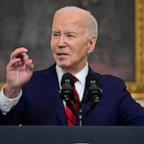Dale Earnhardt Jr. should take all the time he needs
— -- Relief. That's what I felt when I received word Dale Earnhardt Jr. had made the decision to remain on the sidelines for the remainder of 2016.
That was my perspective -- that of a 50-year-old former driver who has sustained many concussions and weighing every conversation I've had with Dale the past two months.
His wasn't the most popular announcement for those hoping to see him compete again (count me among them), but it was the absolute correct announcement as it relates to his future.
Here is why:
• Having not been in a race car for roughly 60 days, Dale has made progress as it relates to the symptoms associated with his concussions, but the symptoms still exist. That's concerning.
• I believe it's your body's way of talking to you, reminding you that there are still repairs needing to be made. Those repairs require time. How much time? Nobody knows.
• To that end, having a conference every two weeks doesn't help a person psychologically. With each announcement comes hope, or expectation. I believe in my heart of hearts that a person like Dale has no interest in letting people down. For a driver in his position, that's added pressure, and it probably doesn't help.
• When symptoms last for an extended period of time, you begin questioning yourself. "Why is this taking longer than before? Did I cross the line (of what a body can tolerate) this time? What if I can't ever race again?" It's hard to imagine, but if you love driving cars fast, it's very uncomfortable to face the prospect of never being able to do it again.
• When you're in your 20s, you have no money, little responsibility, and even less regard for your health. You will do whatever it takes to be successful, to win, to become a member of that elite list of drivers associated with winning at NASCAR's highest level. In your 40s you become aware of the punishment your body has taken, the toll that was paid in order to reach those goals.
The Bottom Line
I'm 10 years into retirement, and I've never replicated the feeling, the sensation of driving race cars, and in particular the elation of being the first to pass under the checkered flag. Winning races delivers a fulfillment I cannot describe, but if you watch how each week's winner celebrates, regardless of it being their first or their 40th, it paints a vivid picture.
That void can be very difficult, even damaging for retired athletes. It's almost impossible to prepare for, and I can tell you, I've had my challenges.
Dale Earnhardt Jr. Is more than just a great athlete, he is an icon. He has the popularity of an Elvis Presley, the skill of a Ken Griffey Jr., with the pressure like Griffey's of following in the footsteps of a legend.
I was relieved for Dale after Friday's announcement because he has a tall, tall, hurdle to clear.
Having stepped out from behind the wheel of his car twice in his career because of concussion-type symptoms, he cannot risk a third. Not at 42. It simply doesn't make sense.
The temptation to come back because you feel better, because you have been cleared could set Dale back with the possibility of the symptoms returning because of the loads from the banking, the g-force, vibrations, noise and frequencies.
These aren't things most people consider. These are things I've experienced.
Although I miss driving and competing and know I can't match the value it brought to my life, I've discovered a whole new appreciation for the things I do have.
My three healthy children are front and center. They light up my life.
My view of Dale's circumstance isn't exclusive to the race car driver, it's also about the son, the brother, the fiancé and the friend.
Trust me when I tell you, Dale's decision on when or whether to return has great implications.




